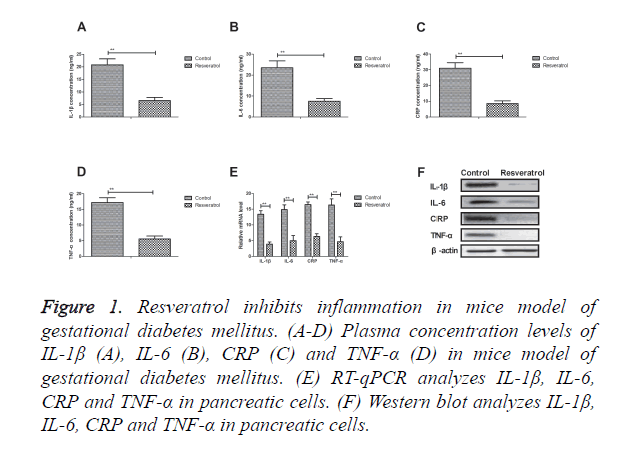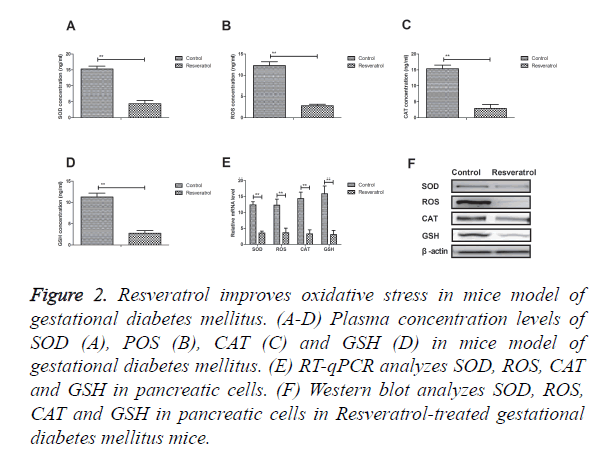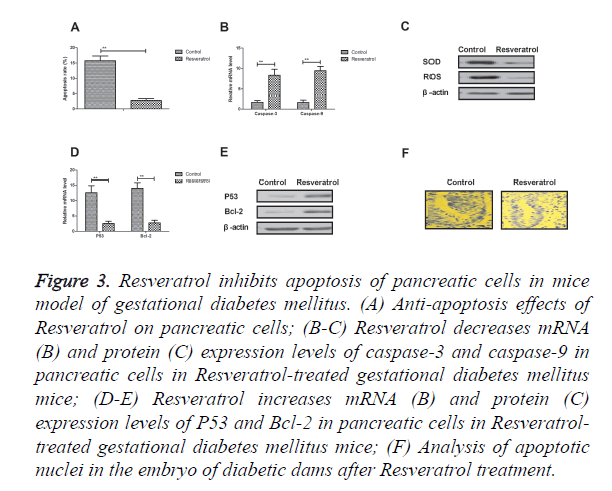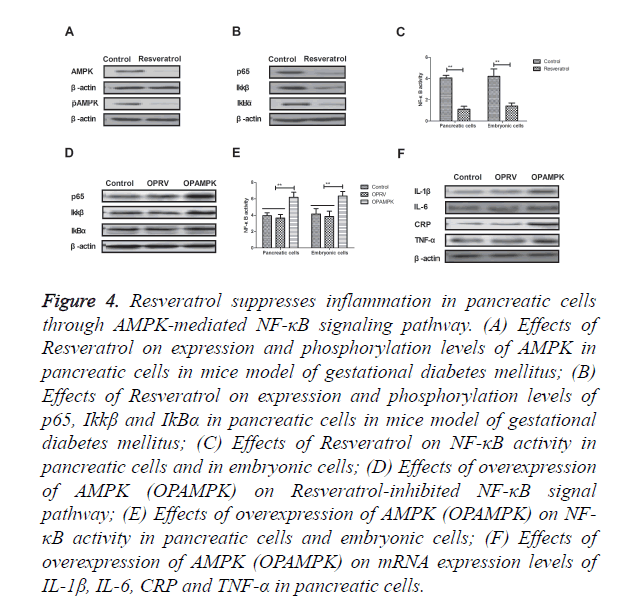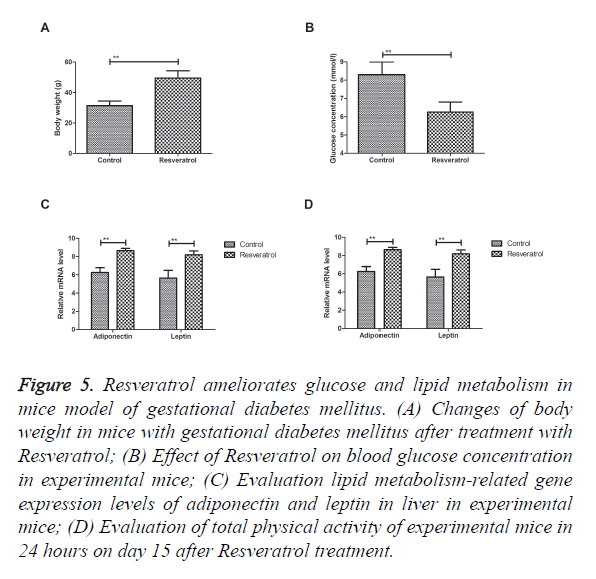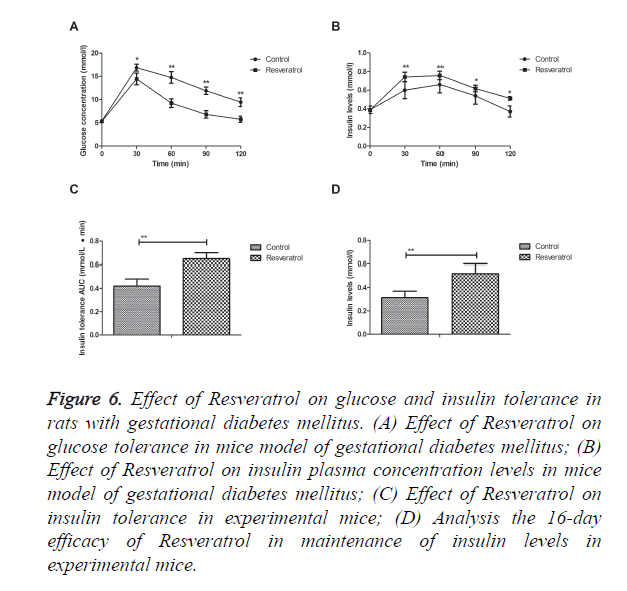Research Article - Biomedical Research (2017) Volume 28, Issue 8
Resveratrol ameliorated gestational diabetes through regulation of AMPKmediated NF-kB signaling pathway
Bo Hong*, Xiang Ding, Hongmei Jia and Jianmei ZhangDepartment of Medical, Haidian Maternal and Child Health Care, Beijing, PR China
- *Corresponding Author:
- Bo Hong
Department of Medical
Haidian Maternal and Child Health Care, PR China
Accepted on December 06, 2016
Abstract
Gestational diabetes mellitus is one kind of complications of pregnancy, which influence the health of maternal-child in clinical. Evidences have showed that Resveratrol presents benefits for the treatment of gestational diabetes. However, potential mechanisms of Resveratrol-mediated improvements of glucose and lipid metabolism have not been well understood so far. In this study, we investigated the therapeutic effects and potential mechanism of Resveratrol-mediated treatments for gestational diabetes. We investigated the inflammation, oxidative stress, apoptosis and adenosine monophosphateactivated protein kinase (AMPK) in embryos in embryonic day 16 in a mice model of gestational diabetes induced by streptozotocin. Glucose, insulin resistance and glucose and lipid metabolism were also analyzed in mice model of gestational diabetes after treatment with Resveratrol. Our results showed that Resveratrol treatment significantly decreased inflammatory factors expression, such as IL-1β, IL-6, CRP and TNF-α. Resveratrol (8.0 mg/kg) administration decreased expression levels of SOD, ROS, CAT and GSH in oxidative stress. Apoptosis of pancreatic cells in rats was inhibited by Resveratrol treatment through decreasing pro-apoptosis protein expression and increasing anti-apoptosis protein expression. Results also demonstrated that Resveratrol administration down-regulated AMPK expression and activity, which further inhibited expression levels of p65, Ikkβ and IkBα in embryonic cells. Mechanism analyses demonstrated that Resveratrol inhibited inflammatory pathway of embryonic cells through AMPK-mediated NF-κB signaling pathway. In vivo assays showed that metabolism of glucose and lipid were improved and tolerance of glucose and insulin were meliorated in mice model of gestational diabetes mellitus. In conclusion, these results indicate that resveratrol treatment decreased inflammation, prevented apoptosis, decreased embryonic oxidative stress, improved metabolism of glucose and lipid, and meliorated glucose and insulin levels of gestational diabetes mellitus mice, which suggest Resveratrol may be promising agent for the treatment of diabetic pregnancy.
Keywords
Gestational diabetes mellitus, Resveratrol, Inflammation, Metabolism, AMPK, Apoptosis, Oxidative stress.
Introduction
Gestational diabetes mellitus is a typically disease manifests with symptoms including gestational hypertension, insulin resistance, fetal mal-development and subclinical metabolic dysfunction caused by insufficient insulin production or signaling in in mid to late pregnancy [1-3]. Systematic review and meta-analysis has indicated that inflammation is associated with initiation and progression of gestational diabetes mellitus, which may be contribute to the development of gestational diabetes mellitus-mediated syndrome during pregnancy [4,5]. Therefore, understanding pathophysiology and identifying potential mechanisms of major pregnancy complications is important to effective prevention and optimal treatment for patients suffered gestational diabetes mellitus. Currently, Resveratrol is multifunctional biological polyphenol that plays ameliorative effects on higher inflammatory factor concentration, impaired insulin response, glucose metabolism disorders, and suppression of glucose production [6,7].
Researcher have showed that Resveratrol can effectively inhibit endothelium degeneration and prevent productions of necrosis factor alpha in patients with coronary artery disease [8], which also is beneficial for improvements of chronic kidney disease patients through down-regulation of Nrf2 and NF-kappaB in a randomized, double-blind, placebo-controlled, crossover clinical trial [9]. A large number reports have reported benefits of Resveratrol in the treatment of human diseases, such as neurodegenerative diseases, cancers and metabolic syndrome [10-12]. In addition, study has showed that Resveratrol could improve type 2 diabetes mellitus, which may possibly provide a potential adjuvant for the treatment and management of diabetes [13]. Furthermore, Yao et al. have showed that Resveratrol supplement relieves gestational diabetes mellitus in mice through activating AMPK and reducing production and activity of glucose-6-phosphatase [14]. These reports suggest that Resveratrol improves gestational diabetes mellitus through regulation of metabolism and/or inflammation-related signaling pathway.
In this study, we further investigated the benefits of Resveratrol for gestational diabetes mellitus. The potential mechanism mediated by Resveratrol was also analyzed both in vitro and in vivo. Our data have found that Resveratrol decreases inflammation and oxidative stress, inhibits apoptosis of embryonic cells, improves glucose metabolism and insulin resistance in mice with gestational diabetes mellitus. These findings suggest that Resveratrol targeting mitochondria- AMPK-mediated NF-κB signaling pathway in the treatment of gestational diabetes mellitus.
Materials and Methods
Ethics statement
This study was performed accordance with the recommendations in the Guide for the Care and Use of Laboratory Animals of Beijing Haidian maternal and child health care. All operative procedures were approved by Committee on the Ethics of Animal Experiments Defence Research.
Cells culture and reagents
Resveratrol was purchased from Merck (Ameresco, Sigma, US) and configured solution as 100 mg/ml. Pancreatic cells from experimental mice with gestational diabetes mellitus were cultured in Dulbecco’s Modified Eagle’s Medium (MEM) supplied with 10% fetal bovine serum (FBS, Sigma). Cells were cultured at 37°C in a humidified atmosphere of 95% air and 5% CO2.
Animals study
Six-eight weeks old C57BL/6 mice were purchased from Jackson Laboratories and were housed in a temperature-controlled room (25 ± 1°C) with artificial 12/12 h light/dark cycles. Before pregnancy, streptozotocin (65 mg/kg, Sigma, USA) was injected intraperitoneally to induce gestational diabetes mellitus according to previous study [15]. Gestational diabetes mellitus C57BL/6 mice were divided into two groups and received intraperitoneal injection of Resveratrol (Sigma- Aldrich, 10 mg/kg) or PBS. The treatments continued 10 times once a day. Mice were sacrificed for further analyze on day 16.
Quantitative real time PCR (qRT-PCR) analysis
Total RNA was extracted from pancreatic cells by using RNAeasy Mini Kit (QIAGEN, Gaithersburg, MD). Expressions levels of IL-1β, IL-6, CRP, TNF-α, SOD, ROS, CAT and GSH in pancreatic cells were measured by qRT-PCR with β-actin as an endogenous control [16] (Invitrogen, CA, USA). All the forward and reverse primers were synthesized by Invitrogen. Relative mRNA expression changes were calculated by 2−ΔΔCt. The results are expressed as the n-fold way compared to control.
Western blot
Pancreatic cells were homogenized in lysate buffer containing protease-inhibitor and were centrifuged at 8000 rpm/min at 4°C for 10 min. The supernatant of mixture were used for analysis of purpose protein. For western blotting, rabbit anti-mouse primary antibodies (Abcam, Shanghai, China) were used to incubate the purpose proteins after blocking (5% skimmed milk) for 2 hours at 37°C. HRP-jun-IgG were then incubated for primary antibodies for 24 hours at 4°C (Abcam, Shanghai, China). And then proteins were incubated with second antibodies 24 hours at 4°C. The protein expression levels were visualized by using chemi-luminescence detection system.
Endogenous overexpression of AMPK
Pancreatic cells were cultured to 90% confluence and the media was then removed from cultural system. Cells were transfected with peDue12.4-AMPK by using lipfectamine 2000 (Sigma-Aldrich). Stable endogenous overexpression of AMPK Pancreatic cells were selected by GS screening system [17].
Glucose and insulin tolerance tests
Mice with gestational diabetes mellitus were fasted 6 hours and injected intraperitoneally with glucose at dose of 2.0 g/kg for the glucose tolerance test. Blood glucose concentrations were analyzed by performing an ACCU-CHEK advantage glucometer (Roche Diagnostics). The glucose tolerance tests were recorded at baseline and after glucose injection (0, 30, 60, 90, and 120 min). For the insulin tolerance tests, mice with GDM insulin were intraperitoneally injected at 0.75 U/kg body weight for insulin tolerance tests. The experimental mice were intraperitoneally injected with insulin (1.0 mU/kg) after a 60- minute fast and the blood glucose concentration was measured at baseline and after insulin injection (15, 30, 60, 90, and 120 min).
Physical activity analysis by indirect calorimetry
Indirect calorimetry was used to evaluate the physical activity of mice with gestational diabetes mellitus by using the Comprehensive Laboratory Animal Monitoring System (Oxymax/CLAMS; Columbus Instruments). On day 12 after treatment with Resveratrol, physical activity of experimental mice were monitored every 30 minutes for 24 hours to analyze the therapeutic effects of Resveratrol. The respiratory exchange ratio, VO2, VCO2, heat production, and physical activity were measured according to the manufacturers’ instruction.
Apoptosis detection
Pancreatic cells were isolated from experimental mice and trypsinized and collected for apoptosis analysis. The cells were adjusted to 5 × 106 cells/ml with PBS, labeled with annexin V-FITC and PI (Annexin V-FITC Kit, BD), and analyzed with a FACScan flow cytometer (BD). The treatments were performed in triplicate, and the percentage of labeled cells undergoing apoptosis in each group was determined and calculated.
Statistical analysis
All data were presented as mean and SEM with three independent experiments. Statistical significance was analyzed using two tailed Student’s t-test between groups. Unpaired data was analyzed by variance (ANOVA). *P<0.05 and **P<0.01 were considered statistically significant.
Results
Resveratrol inhibits expression levels of inflammatory factors in mice model of gestational diabetes mellitus
Inflammatory factors play important role in the progression of gestational diabetes mellitus [18]. Therefore, we analyzed expression levels of inflammatory factors in mice model of gestational diabetes mellitus. As shown in Figures 1A-1D, IL-1β, IL-6, CRP and TNF-α expression levels were down-regulated by Resveratrol (8.0 mg/kg) administration in serum in mice model of gestational diabetes mellitus. RT-qPCR and western blot showed that Resveratrol treatment markedly decreased gene and protein expression levels of IL-1β, IL-6, CRP and TNF-α in pancreatic cells (Figures 1E and 1F). These outcomes suggest that Resveratrol could inhibit expression levels of inflammatory factors in mice model of gestational diabetes mellitus.
Figure 1. Resveratrol inhibits inflammation in mice model of gestational diabetes mellitus. (A-D) Plasma concentration levels of IL-1β (A), IL-6 (B), CRP (C) and TNF-α (D) in mice model of gestational diabetes mellitus. (E) RT-qPCR analyzes IL-1β, IL-6, CRP and TNF-α in pancreatic cells. (F) Western blot analyzes IL-1β, IL-6, CRP and TNF-α in pancreatic cells.
Resveratrol decreases oxidative stress in mice model of gestational diabetes mellitus
Previous study has showed that oxidative stress is associated with gestational diabetes mellitus [19]. Levels of oxidative stress in plasma and pancreatic-β cells were investigated in this study. As shown in Figures 2A-2D, Resveratrol (8.0 mg/kg) administration decreased plasma concentration levels of SOD, ROS, CAT and GSH in mice model of gestational diabetes mellitus. We also observed that mRNA and protein expression levels of SOD, ROS, CAT and GSH were up-regulated in in pancreatic-β cells in Resveratrol-treated gestational diabetes mellitus mice (Figures 2E and 2F). These results indicate that Resveratrol decreases oxidative stress in mice model of gestational diabetes mellitus.
Figure 2. Resveratrol improves oxidative stress in mice model of gestational diabetes mellitus. (A-D) Plasma concentration levels of SOD (A), POS (B), CAT (C) and GSH (D) in mice model of gestational diabetes mellitus. (E) RT-qPCR analyzes SOD, ROS, CAT and GSH in pancreatic cells. (F) Western blot analyzes SOD, ROS, CAT and GSH in pancreatic cells in Resveratrol-treated gestational diabetes mellitus mice.
Resveratrol suppresses apoptosis of pancreatic cells in mice model of gestational diabetes mellitus
We next investigated anti-apoptosis efficacy of Resveratrol for pancreatic cells. Results showed that Resveratrol inhibited apoptosis of pancreatic cells induced by streptozotocin (Figure 3A). mRNA and protein expression levels of caspase-3 and caspase-9 were down-regulated in pancreatic cells in Resveratrol-treated gestational diabetes mellitus mice (Figures 3B and 3C). However, expression levels of P53 and Bcl-2 were up-regulated by Resveratrol in in pancreatic cells in Resveratrol-treated gestational diabetes mellitus mice (Figures 3D and 3E). Analysis of apoptotic nuclei showed that apoptosis of nuclei in the embryo of diabetic dams was improved after Resveratrol treatment (Figure 3F). These results suggest that Resveratrol inhibits apoptosis of pancreatic cells and embryo of diabetic dams in mice model of gestational diabetes mellitus.
Figure 3. Resveratrol inhibits apoptosis of pancreatic cells in mice model of gestational diabetes mellitus. (A) Anti-apoptosis effects of Resveratrol on pancreatic cells; (B-C) Resveratrol decreases mRNA (B) and protein (C) expression levels of caspase-3 and caspase-9 in pancreatic cells in Resveratrol-treated gestational diabetes mellitus mice; (D-E) Resveratrol increases mRNA (B) and protein (C) expression levels of P53 and Bcl-2 in pancreatic cells in Resveratrol-treated gestational diabetes mellitus mice; (F) Analysis of apoptotic nuclei in the embryo of diabetic dams after Resveratrol treatment.
Resveratrol regulates inflammation in pancreatic cells through AMPK-mediated NF-κB signaling pathway
In order to investigate potential mechanism of Resveratrol-improved inflammation, we analyzed expression and activity of AMPK and NF-κB in pancreatic cells in mice model of gestational diabetes mellitus. As shown in Figure 4A, expression and phosphorylation levels of AMPK were down-regulated in pancreatic cells in Resveratrol-treated gestational diabetes mellitus mice. Results demonstrated expression levels of p65, Ikkβ and IkBα were decreased in pancreatic cells in gestational diabetes mellitus mice treated by Resveratrol (Figure 4B). Activity of NF-κB was significantly downregulated both in pancreatic cells and in embryonic cells (Figure 4C). Mechanism analysis showed that overexpression of AMPK (OPAMPK) abolished Resveratrol-inhibited (OPRV) p65, Ikkβ and IkBα expression levels in pancreatic cells (Figure 4D). NF-κB activity also increased in AMPK-activated pancreatic cells and embryonic cells (Figure 4E). We also found that mRNA expression levels of IL-1β, IL-6, CRP and TNF-α were also up-regulated in AMPK-activated pancreatic cells (Figure 4F). These data suggest that Resveratrol regulates inflammation in pancreatic cells through AMPK-mediated NF- κB signaling pathway.
Figure 4. Resveratrol suppresses inflammation in pancreatic cells through AMPK-mediated NF-κB signaling pathway. (A) Effects of Resveratrol on expression and phosphorylation levels of AMPK in pancreatic cells in mice model of gestational diabetes mellitus; (B) Effects of Resveratrol on expression and phosphorylation levels of p65, Ikkβ and IkBα in pancreatic cells in mice model of gestational diabetes mellitus; (C) Effects of Resveratrol on NF-κB activity in pancreatic cells and in embryonic cells; (D) Effects of overexpression of AMPK (OPAMPK) on Resveratrol-inhibited NF-κB signal pathway; (E) Effects of overexpression of AMPK (OPAMPK) on NF- κB activity in pancreatic cells and embryonic cells; (F) Effects of overexpression of AMPK (OPAMPK) on mRNA expression levels of IL-1β, IL-6, CRP and TNF-α in pancreatic cells.
Resveratrol improves glucose and lipid metabolism in mice model of gestational diabetes mellitus
As shown in Figure 5A, body weight of the pregnant mice was increased in Resveratrol-treated group compared to control. Results demonstrated that Resveratrol improved fasting blood glucose concentration and increased lipid metabolism-related gene in liver in mice with gestational diabetes mellitus (Figures 5B and 5C). We also observed that Resveratrol significantly improved physical activity in mice model of gestational diabetes mellitus compared with control (Figure 5D). Collectively, these data suggest that Resveratrol can improve body weight and metabolism of glucose and lipid in mice model of gestational diabetes mellitus.
Figure 5. Resveratrol ameliorates glucose and lipid metabolism in mice model of gestational diabetes mellitus. (A) Changes of body weight in mice with gestational diabetes mellitus after treatment with Resveratrol; (B) Effect of Resveratrol on blood glucose concentration in experimental mice; (C) Evaluation lipid metabolism-related gene expression levels of adiponectin and leptin in liver in experimental mice; (D) Evaluation of total physical activity of experimental mice in 24 hours on day 15 after Resveratrol treatment.
Resveratrol improves glucose and insulin resistance in mice model of gestational diabetes mellitus
We finally analyzed the efficacy Resveratrol on glucose and insulin tolerance in mice model of gestational diabetes mellitus. Results demonstrated that Resveratrol treatment alleviates glucose and insulin concentration levels in experimental mice after the initial glucose injection (30 and 60 min) compared to control (Figures 6A and 6B). Insulin tolerance test demonstrated that Resveratrol treatment significantly improved insulin tolerance in experimental mice determined by AUC (Figure 6C). Importantly, Resveratrol treatment maintained insulin levels in a 16-day experimental period in mice model of gestational diabetes mellitus (Figure 6D). These data suggest that Resveratrol can improve glucose and insulin resistance in mice model of gestational diabetes mellitus.
Figure 6. Effect of Resveratrol on glucose and insulin tolerance in rats with gestational diabetes mellitus. (A) Effect of Resveratrol on glucose tolerance in mice model of gestational diabetes mellitus; (B) Effect of Resveratrol on insulin plasma concentration levels in mice model of gestational diabetes mellitus; (C) Effect of Resveratrol on insulin tolerance in experimental mice; (D) Analysis the 16-day efficacy of Resveratrol in maintenance of insulin levels in experimental mice.
Discussion
Gestational diabetes mellitus is metabolic-dysfunction pregnant disease, which threats the fetus’ growth and development and increases the incidence rate of type-2 diabetes for pregnant woman [20,21]. The metabolic dysfunction plays vital role in inflammation and apoptosis of embryonic cells during insulin infusion and insulin-stimulated glucose uptake in patients with gestational diabetes mellitus [22,23]. Systematic review and meta-analysis have showed that Resveratrol can be regarded as an adjunct to pharmacological management in type 2 diabetes mellitus [24]. In this study, we investigated the therapeutic effects and potential mechanism of Resveratrol in metabolism of glucose and lipid and tolerance of glucose and insulin in mice model of gestational diabetes mellitus. Anti-oxidative stress and anti-apoptosis efficacies of Resveratrol administration were also performed in pancreatic islets cells in experimental mice. Our results showed that Resveratrol administration not only inhibits inflammatory factors and apoptosis of pancreatic cells and embryonic cells, but also improves glucose and lipid metabolism and glucose and insulin resistance for mice suffered gestational diabetes mellitus.
Resveratrol is a naturally existing polyphenol, which has presented the therapeutic effects in the treatment of diabetes and gestational diabetes mellitus in most of reports descripted previously [25,26]. Previous study has showed that low dose Resveratrol (75 mg) significantly improves cerebrovascular function in type 2 diabetes mellitus, which also relieves endothelial dysfunction sub-clinical cognitive impairment [27]. In addition, Khazaei et al have indicated that Resveratrol may improve osseointegration of dental implants through inhibition of inflammatory factors in serum in type 2 diabetes mellitus patients [28]. Furthermore, Resveratrol is a multifunctional compound that has been reported to present beneficial outcomes for patients with type-II diabetes due to prevention of embryonic oxidative stress and apoptosis [29-31]. In this study, our data have showed that Resveratrol treatment improves inflammation through regulation of AMPK expression and phosphorylation in pancreatic cells and embryonic cells in mice model of gestational diabetes mellitus.
Research by Guan et al. has showed high glucose-induced cardiomyocyte apoptosis and oxidative stress has been proved relation with AMPK signaling pathway [32]. Novoselova et al. have indicated that SAPK/JNK signaling cascades of animal immune cells and their role are related with the progresses of type 1 diabetes mellitus [33]. Study also suggest that inhibition of NF-κB expression and activity resolves cognitive deficits in type 2 diabetes mellitus animals through regulation of CREB and Glutamate/GABA neurotransmitters pathway [34]. Additionally, Resveratrol treatment inhibitspro-inflammatory cytokine secretion in rhabdosarcoma cells through blocking IKKs/NF-kappaB signaling pathway [35]. In this study, our investigation showed that Resveratrol suppresses NF-κB signal pathway, which contributes to inhibition of inflammation and apoptosis of pancreatic cells and embryonic cells in mice model of gestational diabetes mellitus.
In conclusion, this work investigated the efficacy of Resveratrol in mice model of gestational diabetes mellitus. Our data explored the potential mechanism of Resveratrol-mediated inhibition of inflammation and apoptosis in animal’s model of gestational diabetes mellitus. Results have indicated that Resveratrol treatment significantly improves glucose metabolism and insulin resistance in experimental mice of gestational diabetes mellitus. Mechanism analysis has suggested that Resveratrol regulates inflammation in pancreatic cells through AMPK-mediated NF-κB signaling pathway. Taken together, these results indicate that Resveratrol treatment can inhibit apoptosis and inflammation in experimental mice, which may be serving as an effective agent for the treatment of gestational diabetes mellitus.
References
- Phelan S. Windows of Opportunity for Lifestyle Interventions to Prevent Gestational Diabetes Mellitus. Am J Perinatol 2016; 33: 1291-1299.
- Kawakita T, Bowers K, McWhorter K, Rosen B, Adams M. Characterizing Gestational Weight Gain According to Institute of Medicine Guidelines in Women with Type 1 Diabetes Mellitus: Association with Maternal and Perinatal Outcome. Am J Perinatol 2016; 33: 1266-1272.
- Nansseu JR, Ngo-Um SS, Balti EV. Incidence, prevalence and genetic determinants of neonatal diabetes mellitus: a systematic review and meta-analysis protocol. Syst Rev 2016; 5: 188.
- Skorzynska-Dziduszko KE, Kimber-Trojnar Z, Patro-Malysza J, Olszewska A, Zaborowski T, Malecka-Massalska T. An Interplay between Obesity and Inflammation in Gestational Diabetes Mellitus. Current Pharmaceut Biotechnol 2016; 17: 603-613.
- Hernandez TL, Van Pelt RE, Anderson MA, Reece MS, Reynolds RM. Women With Gestational Diabetes Mellitus Randomized to a Higher-Complex Carbohydrate/Low-Fat Diet Manifest Lower Adipose Tissue Insulin Resistance, Inflammation, Glucose, and Free Fatty Acids: A Pilot Study. Diabetes Care 2016; 39: 39-42.
- Chen S, Zhao X, Ran L. Resveratrol improves insulin resistance, glucose and lipid metabolism in patients with non-alcoholic fatty liver disease: a randomized controlled trial. Digest Liver Dis 2015; 47: 226-232.
- Ma T, Tan MS, Yu JT, Tan L. Resveratrol as a therapeutic agent for Alzheimer's disease. Biomed Res Int 2014; 2014: 350516.
- Chekalina NI, Kazakov YM, Mamontova TV, Vesnina LE, Kaidashev IP. Resveratrol more effectively than quercetin reduces endothelium degeneration and level of necrosis factor α in patients with coronary artery disease. Wiad Lek 2016; 69: 475-479.
- Saldanha JF, Leal VO, Rizzetto F. Effects of Resveratrol Supplementation in Nrf2 and NF-kappaB Expressions in Nondialyzed Chronic Kidney Disease Patients: A Randomized, Double-Blind, Placebo-Controlled, Crossover Clinical Trial. J Renal Nutrition 2016; 26: 401-406.
- Vilar-Pereira G, Carneiro VC, Mata-Santos H, Vicentino AR. Resveratrol Reverses Functional Chagas Heart Disease in Mice. PLoS Pathog 2016; 12: e1005947.
- Agarwal R, Agarwal P. Targeting extracellular matrix remodeling in disease: Could resveratrol be a potential candidate? Exp Biol Med (Maywood) 2016.
- Rotman Y. Comment on "Resveratrol improves insulin resistance, glucose and lipid metabolism in patients with non-alcoholic fatty liver disease: A randomized controlled trial" by Shihui Chen et al. [Dig. Liver Dis. 2015;47:226-32]. Dig Liver Dis 2015; 47: 1090.
- Bhatt JK, Thomas S, Nanjan MJ. Resveratrol supplementation improves glycemic control in type 2 diabetes mellitus. Nutr Res 2012; 32: 537-541.
- Yao L, Wan J, Li H, Ding J, Wang Y. Resveratrol relieves gestational diabetes mellitus in mice through activating AMPK. Reprod Biol Endocrinol 2015; 13: 118.
- Tian ZH, Miao FT, Zhang X, Wang QH, Lei N, Guo LC. Therapeutic effect of okra extract on gestational diabetes mellitus rats induced by streptozotocin. Asian Pacific J Tropical Med 2015; 8: 1038-1042.
- Xiao S, Wang J, Xiao N. MicroRNAs as noninvasive biomarkers in bladder cancer detection: a diagnostic meta-analysis based on qRT-PCR data. Int J Biol Markers 2016; 31: e276-285.
- Renshaw A, Elsheikh TM. A validation study of the Focalpoint GS imaging system for gynecologic cytology screening. Cancer Cytopathol 2013; 121: 737-738.
- Abderrazak A, El Hadri K, Bosc E. Inhibition of the Inflammasome NLRP3 by Arglabin Attenuates Inflammation, Protects Pancreatic beta-Cells from Apoptosis, and Prevents Type 2 Diabetes Mellitus Development in ApoE2Ki Mice on a Chronic High-Fat Diet. J Pharmacol Experiment Therapeut 2016; 357: 487-494.
- Kitano D, Takayama T, Nagashima K, Akabane M, Okubo K. A comparative study of time-specific oxidative stress after acute myocardial infarction in patients with and without diabetes mellitus. BMC Cardiovasc Disord 2016; 16: 102.
- Horvath K, Koch K, Jeitler K, Matyas E, Bender R. Effects of treatment in women with gestational diabetes mellitus: systematic review and meta-analysis. BMJ 2010; 340: c1395.
- Dode MA, dos Santos IS. Non classical risk factors for gestational diabetes mellitus: a systematic review of the literature. Cad Saude Publica 2009; 25 Suppl 3: S341-359.
- Kim SY, England JL, Sharma JA, Njoroge T. Gestational diabetes mellitus and risk of childhood overweight and obesity in offspring: a systematic review. Exp Diabetes Res 2011; 2011: 541308.
- Oostdam N, van Poppel MN, Wouters MG, van Mechelen W. Interventions for preventing gestational diabetes mellitus: a systematic review and meta-analysis. J Womens Health (Larchmt) 2011; 20: 1551-1563.
- Hausenblas HA, Schoulda JA, Smoliga JM. Resveratrol treatment as an adjunct to pharmacological management in type 2 diabetes mellitus--systematic review and meta-analysis. Mol Nutrition Food Res 2015; 59: 147-159.
- Gonzalez-Rodriguez A, Santamaria B, Mas-Gutierrez JA. Resveratrol treatment restores peripheral insulin sensitivity in diabetic mice in a sirt1-independent manner. Mol Nutrition Food Res 2015; 59: 1431-1442.
- Gencoglu H, Tuzcu M, Hayirli A, Sahin K. Protective effects of resveratrol against streptozotocin-induced diabetes in rats by modulation of visfatin/sirtuin-1 pathway and glucose transporters. Int J Food Sci Nutrition 2015; 66: 314-320.
- Wong RH, Nealon RS, Scholey A, Howe PR. Low dose resveratrol improves cerebrovascular function in type 2 diabetes mellitus. Nutrition Metabol Cardiovascular Dis NMCD 2016; 26: 393-399.
- Khazaei S, Firouzei MS, Afghari P, Khazaei M. Resveratrol may improve osseointegration of dental implants in type 2 diabetes mellitus patients. J Res Med Sci 2014; 19: 81.
- Evans HM, Howe PR, Wong RH. Clinical Evaluation of Effects of Chronic Resveratrol Supplementation on Cerebrovascular Function, Cognition, Mood, Physical Function and General Well-Being in Postmenopausal Women-Rationale and Study Design. Nutrients 2016; 8: 150.
- Toth P, Tarantini S, Tucsek Z, Ashpole NM, Sosnowska D. Resveratrol treatment rescues neurovascular coupling in aged mice: role of improved cerebromicrovascular endothelial function and downregulation of NADPH oxidase. Am J Physiol Heart Circ Physiol 2014; 306: H299-308.
- Beaudoin MS, Snook LA, Arkell AM, Simpson JA, Holloway GP, Wright DC. Resveratrol supplementation improves white adipose tissue function in a depot-specific manner in Zucker diabetic fatty rats. Am J Physiol Regul Integr Comp Physiol 2013; 305: R542-551.
- Guan Y, Cui ZJ, Sun B, Han LP, Li CJ, Chen LM. Celastrol attenuates oxidative stress in the skeletal muscle of diabetic rats by regulating the AMPK-PGC1alpha-SIRT3 signaling pathway. Int J Mol Med 2016; 37: 1229-1238.
- Novoselova EG, Khrenov MO, Parfenyuk SB, Novoselova TV, Lunin SM, Fesenko EE. The NF-kappaB, IRF3, and SAPK/JNK signaling cascades of animal immune cells and their role in the progress of type 1 diabetes mellitus. Dokl Biol Sci 2014; 457: 255-257.
- Datusalia AK, Sharma SS. NF-kappaB Inhibition Resolves Cognitive Deficits in Experimental Type 2 Diabetes Mellitus through CREB and Glutamate/GABA Neurotransmitters Pathway. Curr Neurovascular Res 2016; 13: 22-32.
- Zhang L, Li Y, Gu Z, Wang Y, Shi M. Resveratrol inhibits enterovirus 71 replication and pro-inflammatory cytokine secretion in rhabdosarcoma cells through blocking IKKs/NF-κB signaling pathway. PLoS One 2015; 10: e0116879.
